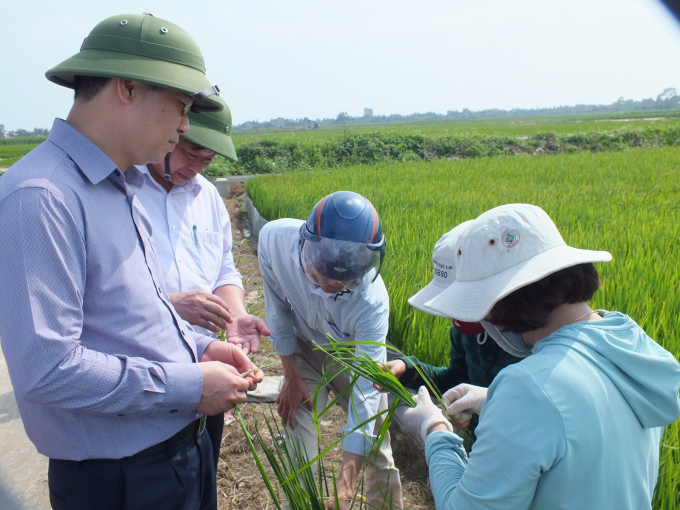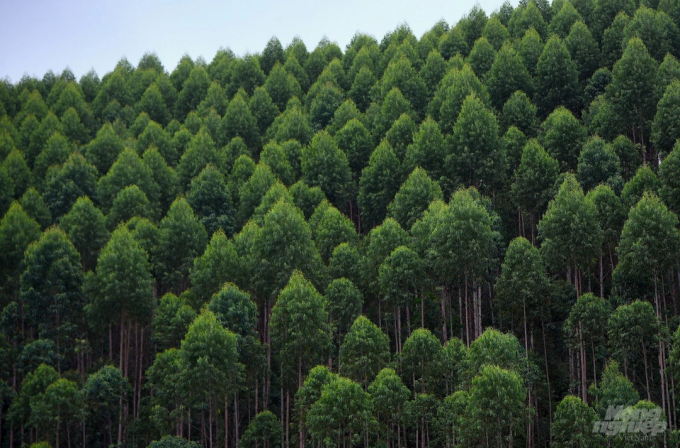June 21, 2025 | 03:31 GMT +7
June 21, 2025 | 03:31 GMT +7
Hotline: 0913.378.918
June 21, 2025 | 03:31 GMT +7
Hotline: 0913.378.918

Minister of Agriculture and Rural Development Nguyen Xuan Cuong addressed the issues raised by delegates at the Nov 3rd morning session, the 10th session of the 14th National Assembly. Photo: Minh Phuc.
In the first half of the Nov 3rd morning session at the National Assembly, there were 7 comments from delegates (including 4 directly related to the agricultural sector).
Most of the comments focused on hot issues such as forest quality degradation that resulted in extreme weather events; Shortcomings in the control of fertilizers and plant protection drugs; and the need for a sustainable development policy for the Mekong Delta.
Minister of Agriculture and Rural Development Nguyen Xuan Cuong affirmed that agriculture is aiming at creating clean products. In 2016, the production of fertilizers and plant protection drugs grew out of control.

The rate of using biological plant protection products has increased to 20%. Photo: NNVN.
At that time, we used over 10 million tons of fertilizers and mostly inorganic fertilizers. But so far, we have increased our organic fertilizer production by almost 4 million tons. This is a very positive progress.
In addition, we now have more than 243,000 ha in 45 provinces/cities for organic agricultural production and Vietnam exported US$ 235 million of organic agricultural products in 2019 while only imported 75,000 tons of plant protection drugs, of which 20% is of biological origin.
Regarding the issue of sustainable forest development, Minister Nguyen Xuan Cuong said that at present we have about 14.6 million ha of forest. This is an extraordinary attempt of the political system and the people.

Vietnam’s participation in sustainable development has been recognized. Photo: Dinh Tung.
Our current forest cover is close to 42% while the world average is 29%. Out of 4.3 million hectares of planted forests, we have produced 30 million cubic meters of raw materials for the 4,600 processing enterprises of forestry sector. This year, we can export up to US$ 13 billion of forest products.
As for natural forests, the Party, State, National Assembly, and Government always come up with better policies for people to keep the targeted 1 million hectares of forest.
Thanks to the policy of paying for forest environment services, we are able to mobilize VND30,000 billion. On October 20th, 2020, Vietnam officially signed a cooperation agreement on carbon credits from forests. As a result, we sell 10 million cubic meters of CO2 at US$5 for every 1m3 of CO2.
“Vietnam’s participation in sustainable development has been recognized, thereby gaining more than VND 1,000 billion for 6 central provinces. At the same time, it shows that Vietnam is engaged to sustainable development”, said Minister Nguyen Xuan Cuong.
It is a good sign that we are shifting from nature exploitation to nature-centered approach. Therefore, in the past four years, 400,000 ha of rice land has been converted to aquaculture and fruit trees cultivation. This is a big progress in agricultural development of 13 provinces in the Mekong Delta.
Author: Minh Phuc. Translated by Meagan Phan. Edited by Duc Huy.

(VAN) The waste of resources from agricultural by-products and the situation of counterfeit and poor quality goods in production causing losses of thousands of billions were pointed out by the National Assembly deputy.

(VAN) After 5 years of implementation, the CAI initiative has helped coffee growers change their farming practices, moving toward responsible agriculture that meets global export standards.

(VAN) The primary prerequisite for the comprehensive and robust integration of Vietnam's livestock sector into the global value chain is the establishment of a disease control system.

(VAN) The results of national programs are essential for establishing a contemporary livestock sector that is well-equipped to meet the demands of both domestic and international markets, with robust biosafety standards.

(VAN) The UNESCO Global Geopark revalidation of Non nuoc Cao Bang and the transition to a two-tier administrative model are presently undergoing a pivotal moment in Cao Bang, the northernmost province of Vietnam.
/2025/06/13/5330-2-004539_953.jpg)
(VAN) Changing policy mindset and removing investment barriers are urgent requirements to open up new development space for enterprises in the agricultural sector.

(VAN) The areas include the restoration of five million hectares of marine ecosystems.